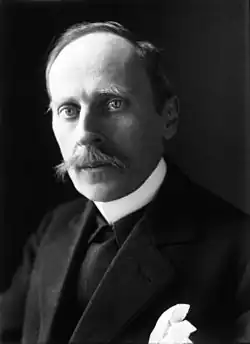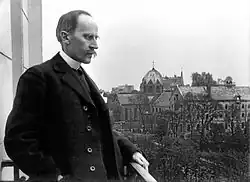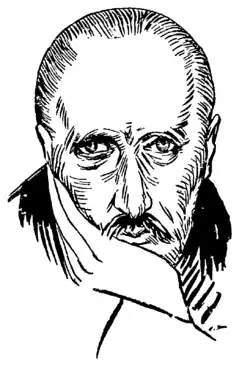Romain Rolland

Romain Rolland (29 January 1866 – 30 December 1944) was a French writer who received the Nobel Prize for Literature in 1915 after the publication of his major work, Jean-Christophe.
- See also: Jean-Christophe (1904‒1912)
Quotes

- Theatre supposes lives that are poor and agitated, a people searching in dreams for a refuge from thought. If we were happier and freer we should not feel hungry for theatre. ... A people that is happy and free has need of festivities more than of theatres; it will always see in itself the finest spectacle.
- Le Théâtre du peuple (1903)
- There is only one necessary condition for the emergence of a new theatre, that the stage and auditorium should be open to the masses, should be able to contain a people and the actions of a people.
- Le Théâtre du peuple (1903)
- I find war detestable but those who praise it without participating in it even more so.
- "Inter arma Caritas", Journal de Genève (30 October 1914), reported in Rhoda Thomas Tripp (ed.) The International Thesaurus of Quotations (NY: Thomas Y. Crowell, 1970) p. 685
- Are you descendants of Goethe or of Attila the Hun?
- 1914 open letter to the Germans as a reaction to the torching of the The Academic Library of the Louvain Catholic University in Belgium. Reported in Barbara W. Tuchman, The Guns of August (NY: Macmillan, 1962) p. 321
- What I especially love in Lefebvre is this intimate alliance — which for me makes the true man — of pessimism of the intelligence, which penetrates every illusion, and optimism of the will.
- "Le sacrifice d'Abraham", in L'Humanite (19 March 1920); also attributed to Antonio Gramsci: Pessimismo dell'intelligenza, ottimismo della volontà
- In politics, he has always been a republican with advanced Socialist sympathies, and internationalist at heart, and, as they said in the eighteenth century, a "citizen of the world." He has always fought social injustice. In art, he loves, above all, Beethoven, Shakespeare, and Goethe...Rembrandt is the painter dearest to him. But his chosen country is Italy.
- On himself, as quoted in World Authors 1900-1950 (1996)
- One makes mistakes; that is life. But it is never a mistake to have loved.
- As quoted in Kimberly Kirberger, On Relationships: A Book for Teenagers (1999)
Life of Vivekananda and the Universal Gospel (1931)
- Tr. E. F. Malcohn-Smith; Advaita Ashrama
- Religious faith in the case of Hindus has never been allowed to run counter to scientific laws; moreover the former is never made a condition for the knowledge they teach, but they are always scrupulously careful to take into consideration the possibility that by reason both the agnostic and atheist may attain truth in their own ways.
- Pt. 2, ch. 2
- A hundred facts testify to how great an extent the East was mingled with Hellenic thought during the second century of our era.
- Appx. 3
Life of Ramakrishna (1929)

- If there is one place on the face of the earth where all the dreams of living men have found a home from the very earliest days when man began the dream of existence, it is India. ... For more than 30 centuries, the tree of vision, with all its thousand branches and their millions of twigs, has sprung from this torrid land, the burning womb of the Gods. It renews itself tirelessly showing no signs of decay.
- Let us return to our eagle's nest in the Himalayas. It is waiting for us, for it is ours, eaglets of Europe, we need not renounce any part of our real nature...whence we formerly took our flight.
- Religious faith in the case of the Hindus has never been allowed to run counter to scientific laws, moreover the former is never made a condition for the knowledge they teach, but there are always scrupulously careful to take into consideration the possibility that by reason both the agnostic and atheist may attain truth in their own way. Such tolerance may be surprising to religious believers in the West, but it is an integral part of Vedantic belief.
- The true Vedantic spirit does not start out with a system of preconceived ideas. It possesses absolute liberty and unrivalled courage among religions with regard to the facts to be observed and the diverse hypotheses it has laid down for their coordination. Never having been hampered by a priestly order, each man has been entirely free to search wherever he pleased for the spiritual explanation of the spectacle of the universe.
- The greatest human ideal is the great cause of bringing together the thoughts of Europe and Asia; the great soul of India will topple our world.
- The vast and tranquil metaphysics of India is unfolded; her conception of the universe, her social organization, perfect in its day and still capable of adaptation to the demands of modern times; the solution which she offers for the feminist problem, for the problems of the family, of love, of marriage; and lastly, the magnificent revelation of her art. The whole vast soul of India proclaims from end to end of its crowded and well ordered edifice the same domination of a sovereign synthesis." There is no negation. All is harmonized. All the forces of life are grouped like a forest, whose thousand waving arms are led by Nataraja, the master of the Dance. Everything has its place, every being has its function, and all take part in the divine concert, their different voices, and their very dissonances, creating, in the phrase of Heraclitus, a most beautiful harmony. Whereas in the West, cold, hard logic isolates the unusual, shutting it off from the rest of life into a definite and distinct compartment of the spirit. India, ever mindful of the natural differences in souls and in philosophies, endeavors to blend them into each other, so as to recreate in its fullest perfection the complete unity. The matching of opposites produces the true rhythm of life.
- Of course, this entire fabric of Indian life stands solidly on faith, that is to say, on a slender and emotional hypothesis. But amid all the beliefs of Europe, and of Asia, that of the Indian Brahmins seems to me infinitely the most alluring. And the reason why I love the Brahmin more than the other schools of Asiatic thought is because it seems to me to contain them all. Greater than all European philosophies, it is even capable of adjusting itself to the vast hypotheses of modern science. Our Christian religions have tried in vain, when there were no other choice open to them, to adapt themselves to the progress of science. But after having allowed myself to be swept away by the powerful rhythm of Brahmin thought, along the curve of life, with its movement of alternating ascent and return, I come back to my own century, and while finding therein the immense projections of a new cosmogony, offspring of the genius of Einstein, or deriving freely from the discoveries, I yet do not feel that I enter a strange land. I yet can hear resounding still the cosmic symphony of all those planets which forever succeed each other, are extinguished and once more illumined, with their living souls, their humanities, their gods – according to the laws of the eternal To Become, the Brahmin Samsara – I hear Siva dancing, dancing in the heart of the world, in my own heart.
- In the great philosophy of Brahma, such violent turns of the scale are quite unknown. It embraces vast stretches of time, cycles of human ages, whose successive lives gravitate in concentric circles, and travel ever slowly towards the center.
Journey Within (1947)

- Never do I hesitate to look squarely at the unexpected face that every passing hour unveils to us, and to sacrifice the false images of it formed in advance, however dear they may be. In me, the love of life in general predominates over love of my own life (that, indeed, would never have sufficed to bear me up). May life herself speak! However inadequate I may be in listening to her, and in repeating her words, I shall try to record them, even if they contradict my most secret desires. In all that I write, may her will, not mine, be done!
- Invitation to the Journey
- No one ever reads a book. He reads himself through books, either to discover or to control himself. And the most objective books are the most deceptive. The greatest book is not the one whose message engraves itself on the brain, as a telegraphic message engraves itself on the ticker-tape, but the one whose vital impact opens up other viewpoints, and from writer to reader spreads the fire that is fed by the various essences, until it becomes a vast conflagration leaping from forest to forest.
- Ch. 2: The Three Revelations
Quotes about Rolland
- The Western misreading of the Soviet system was largely the product of a simple reflex. ... Whatever its doubtless temporary — or invented — faults (so the thinking went), the Soviet ideology stood for a better world. ... [E]ven Romain Rolland, the sensitive follower of Gandhi, spoke out in defense of the purges.
- Robert Conquest, "The Terrors", in The Atlantic Monthly (July-August 2004)
- That I have been allowed to exchange a greeting with you will remain a happy memory to the end of my days.
- Sigmund Freud, in a 1923 letter to Roland, as quoted in William B. Parsons, The Enigma of the Oceanic Feeling: Revisioning the Psychoanalytic Theory of Mysticism (1999) p. 23
- Goethe and Romain Rolland paint psychological landscapes, depicting both characters and spiritual conditions, but the Japanese-Flaubertian analytical tanka is a form alien to them.
- Osip Mandelstam, The Nineteenth Century, translated into English in The Complete Critical Prose (1997)